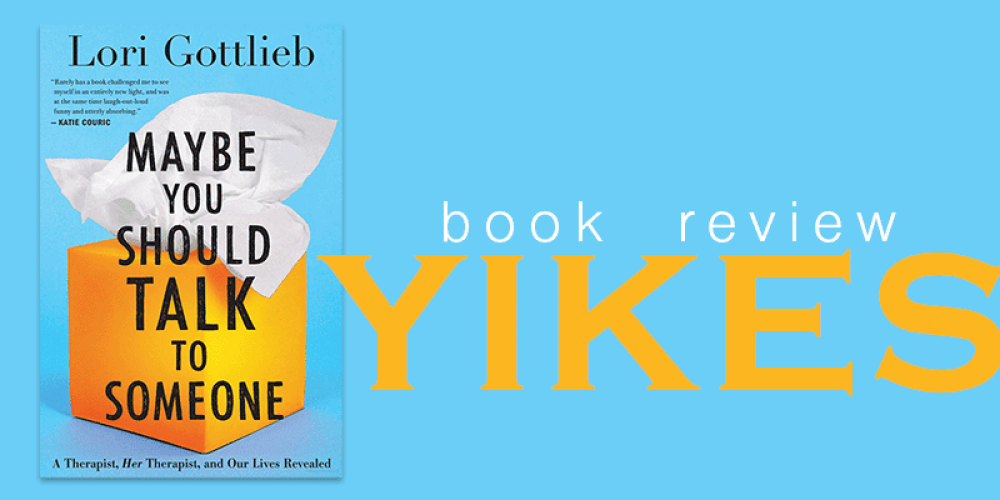Yikes, Lori.
YIKES.

Do you want a therapist who’ll make fun of you and your problems?
Or do you want a therapist who’s already done their inner work?
It’s a laughable question, yes.
But it’s no longer a laughing matter when a book that completely ignores this question ends up on the New York Times bestseller list.

Yes, the Goodreads page for therapist-slash-writer Lori Gottlieb’s Maybe You Should Talk to Someone practically overflows with positive reviews. Based on these reviews alone, it sure looks like a lot of people finished reading the book full of newfound motivation to get into therapy. But even the least media-literate among us know that online reviews should never be trusted to tell the full story.

The Myth of the “Good Patient” Strikes Again!
Yes, for at least some of those people who left 5-star reviews, the book is what got them in the door of their friendly neighborhood therapist. But it also brought them into therapy thinking they know how this whole therapy thing will work—based solely on their “behind-the-scenes tour” with Gottlieb. Unfortunately, these prospective patients have faulty predictions about how their whole therapy journey is going to go down.
In fact, I’d bet good money that more than a few of those people enter therapy with the misplaced determination to be a “good patient.” After all, they’ve read how Gottlieb internally rolls her eyes at one of her more “obnoxious” patients. They’ve cringed along with Gottlieb at the patient who makes her “want to scream.”
Anyone who read Maybe You Should Talk to Someone needs to hear this:
If you want to get something out of therapy, you’re going to have to be a “difficult” patient at least some of the time. Behaving like a “good” patient messes with the real and uncomfortable work of therapy.
Because what good could it do to start therapy with the belief that when you’re not a good patient, you know—or think you know—exactly what the therapist is going to think about you?
If you edit yourself in sessions out of fear that your therapist is going to talk about you with colleagues, you’re only reinforcing a problem that many of us already carry around with us all day, every day.
TL;DR: Caring a lot about what your therapist thinks of you is a huge obstacle to making any progress in therapy.

“But Leah, she changed their names so it’s fine!”
Of course it’s important to acknowledge that Gottlieb went to some great lengths to conceal the identities of people who appear in the book. According to the foreword, she camouflaged certain details and (in some cases) combined more than one patient into a single composite character. I mean, we all have to do these things as therapists who are speaking or writing publicly about our practice. My problem is that I feel strongly that Gottlieb used them in public for her own purposes.
The other real problem I have with the book is Gottlieb’s judgmental and condescending attitude toward her patients. Yes, by the last page she has owned up to this problematic attitude. But the damage has already been done, folks!
I cringe for the current and former patients who recognize an unflattering version of themselves in one of the book’s “characters.” But more importantly: By judging her patients so harshly for the whole world to read, Gottlieb has made a nightmare come true.
Because what is everyone afraid of when they think about starting therapy? They’re afraid they’ll be judged or used or made fun of. For someone who claims to believe in therapy’s power to change lives for the better, publicly judging and making fun of your clients is a big no-no.
“So…Does Gottlieb Herself Need Therapy?”

Not necessarily. She definitely needed to engage in supervision or consultation. Supervision and consultation are therapist tools that are very specifically about examining the ways you’re feeling about your patients—and using those feelings to help the patient rather than using them to protect yourself—or sell a book!! Supervision and/or consultation is the crucible within which you learn to use your own experience for the benefit of your patients.
The goal of a therapist is not to have zero negative reactions to patients who are acting out, lacking self-awareness, or just plain being annoying. The goal is to notice and engage with those negative reactions, in ultimate service of the patient.
It’s true, guys. Perhaps your therapist does notice negative feelings, ideas, and thoughts they have that arise in response to you. (FYI, in therapist-speak this is “negative countertransference.”) But the very first thing any responsible mental-health professional does when faced with negative countertransference is ask themselves a few essential questions:
- What does my negative reaction tell me about how I’m misunderstanding you?
- How does my negative reaction show me how I need to meet you exactly where you need to be met?
- What is missing in your life that my negative reaction points out, so I can work on providing that need to you?
Yes, your therapist might be judging you, but if they’re a good therapist, they are thinking about why they’re judging you so that they can help you.
The therapist-client relationship is like a parent-child relationship, in the sense that one person’s needs are astronomically more important than the other’s. You as a therapist have to just take a deep breath, try to reframe your frustration, and focus on the client’s needs.
“Come on, Leah. Therapists are people just like everyone else.”

Could not agree more. But here’s what’s truly scary: Gottlieb’s attitude toward her clients sounds a lot like that of a newbie therapist who just started training. Alas: Gottlieb is supposedly a fully licensed, properly trained, and skilled practitioner.
As such, what she should have been doing from the very beginning is saying to herself: “This is not about them. What’s going on inside me that I’m casting this judgment? What is it about them that I’m not understanding, making me turn on them rather than look at myself?”
For me at least, this whole book was about her looking at them, rather than turning her professional gaze back onto herself. Admittedly, she finally did it at the end! But boy, did she cruelly and irresponsibly judge a lot of innocent people along the way.
If I were one of her patients reading this book, I’d think, “She’s using us to come to her own conclusions, instead of proactively doing her inner work.”
Dude, you’re a therapist. This is YOUR ONE JOB. You should know better than to do such a disservice to the public.









